 Most people don’t believe a pandemic of this magnitude can happen until it already has. That’s not stupidity or weakness, it’s just human nature. Throughout history, nothing has killed more human beings than deadly pathogens.
Most people don’t believe a pandemic of this magnitude can happen until it already has. That’s not stupidity or weakness, it’s just human nature. Throughout history, nothing has killed more human beings than deadly pathogens.
It is part of our DNA as a species to battle and endure the unseen forces of nature. Viruses are an existential threat. Yet, they’re a vital buildup to our anti-fragility as a species. Much like antibodies counteracting with foreign contaminants. It is how we as a species develop our immune system.
Yes, people will die in the process. It is Darwinian. Survival of the fittest.
Unfortunately, there isn’t a scenario in which mankind can end all deadly diseases on earth. If there is, it would be a sterile environment. And life wouldn’t have been as resilient as it is today.
Now, I’m not a doctor. I don’t know anything technical about molecular biology or deadly pathogens. But one thing I do understand is our immune system needs lots of practice. It needs lots of germs to practice on. To an extent.
If you kill all the germs around you, in a completely sterile environment, you can bet that the next super germ that comes along is going to liquefy your internal organs. … and you’re gonna get sick, you’re going to die because you’re weak. You’ve got a weak immune system!
Studies have shown that if you raise a child in a sterile environment, they don’t develop the kind of necessary immune system. Nowadays, the rates of asthma and allergy are through the roof. That’s the kind of population you would have when you raise children inside a bubble.
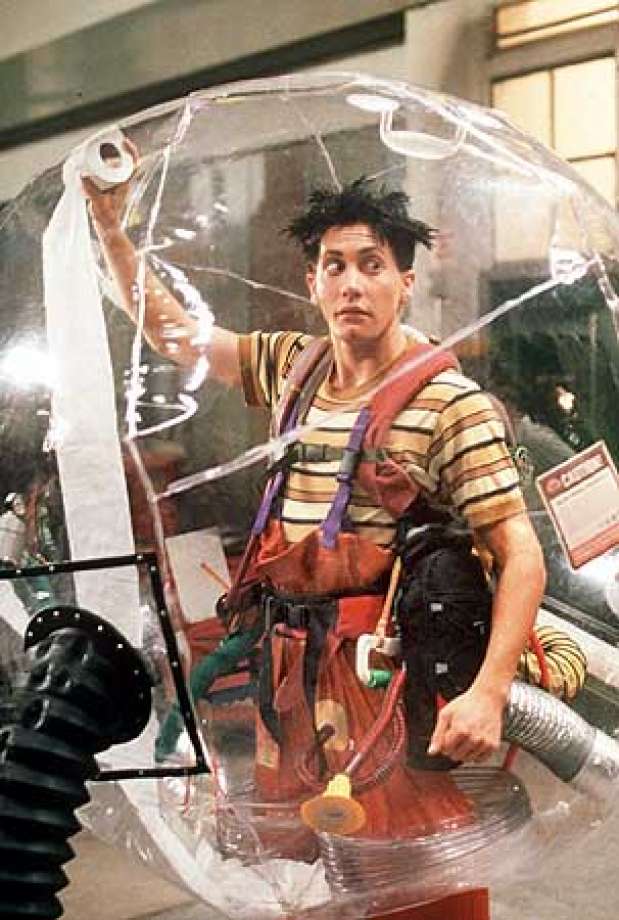
You call them bubble boys. Children without an immune system. It’s tragic that we’re headed in that direction. In the third world, you don’t have these kinds of problems. Children don’t experience extreme allergic reactions to common food or medication.
Why? Because they have a more robust immune system. They’re exposed to pathogens all the time. How do kids in the ’40s probably ’50s or ’60s get immunized? Well. they swim in rivers filled with bacteria to cool off.
I can’t recommend doing that to boost your immune system, but…
As George Carlin so eloquently states, “If you kill all the germs around you and live a completely sterile life, then when germs do come along you’re not going to be prepared.“
Funny thing is, scientists have arrived at a similar conclusion. Dubbed the ‘hygiene hypothesis,’ the theory argues we should stop demonizing germs. Over sanitized, germ-free lives are contributing to the rise in auto-immune disorders.
Countries that fought this pandemic to a standstill were previously "vaccinated" by SARS, and developed health systems and personal habits that mobilized early against SARS-CoV2.
Countries that never faced SARs have to fight its deadlier cousin without a primed immune response.
— Naval (@naval) March 24, 2020
You see, you can never create a system that is fully isolated from the world. It’s only a matter of time before something foreign gets introduced to a system.
It’s hard to see how new pathogens alone could have caused such a massive upheaval. It’s common today to explain anything and everything as the result of human error, but the truth is that the earth’s microbial ecology never rests.
There are no lunch breaks.
It is in constant flux. Every noteworthy pandemic or plague in history occurred against the background of some new form of microbe.
New kinds are born all the time. They mutate and self-replicate non-stop.
If you build a system that’s completely isolated from the world with hopes that it’s safer for people … Guess what the people are going to evolve to. They’re going to be extremely fragile.
At some point, the system that’s been isolated for far too long develops no immunity whatsoever. Then a little exposure to something as small as a pollen particle would incur extreme allergic reactions that causes death. Something a properly exposed and stimulated individual can resist with ease.
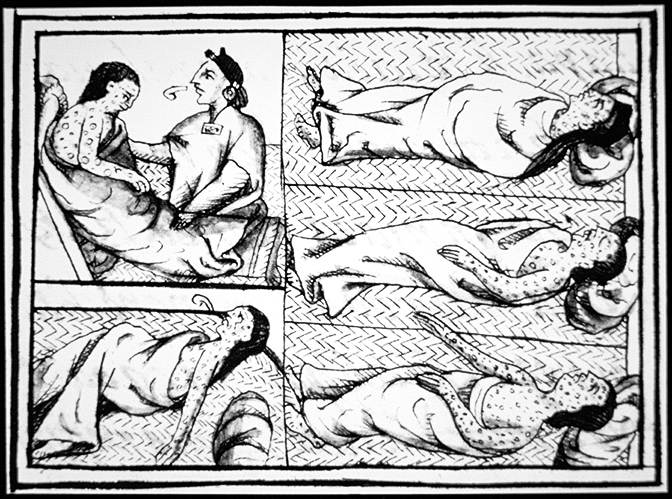
PNP344514 Native American Aztec people of Mexico dying of Small Pox introduced by the Spaniards, copied from the Codex Florentine, c.1540 (colour litho) by .; Private Collection; Peter Newark American Pictures; out of copyright
We’ve seen this before… When Europeans brought deadly pathogens over to the new world. A world inside a bubble, sealed off from the rest of the world.
Indigenous inhabitants from the Americas, to Australia fell victim to terrible plagues like smallpox, influenza and other viruses. Disappearing off the face of the earth.
See the problem with living inside a bubble is that you can’t trade through them. And people love to trade. It’s how relationships are built, money is made and commerce happen. Bubbles are antithetical to commerce.
If you have a system that is exposed to external attacks all the time, it’s not that it has a lot of bugs, it’s just that you keep discovering new ones. And in the process, you get immunized. And in the process, the system gets stronger.
Building resilient systems is about exposing them, exposing them to continuous attack. That’s how you build resilient systems. Weak systems behind bubbles are not going to survive, they’re not going to be secure, they can backfire easily.
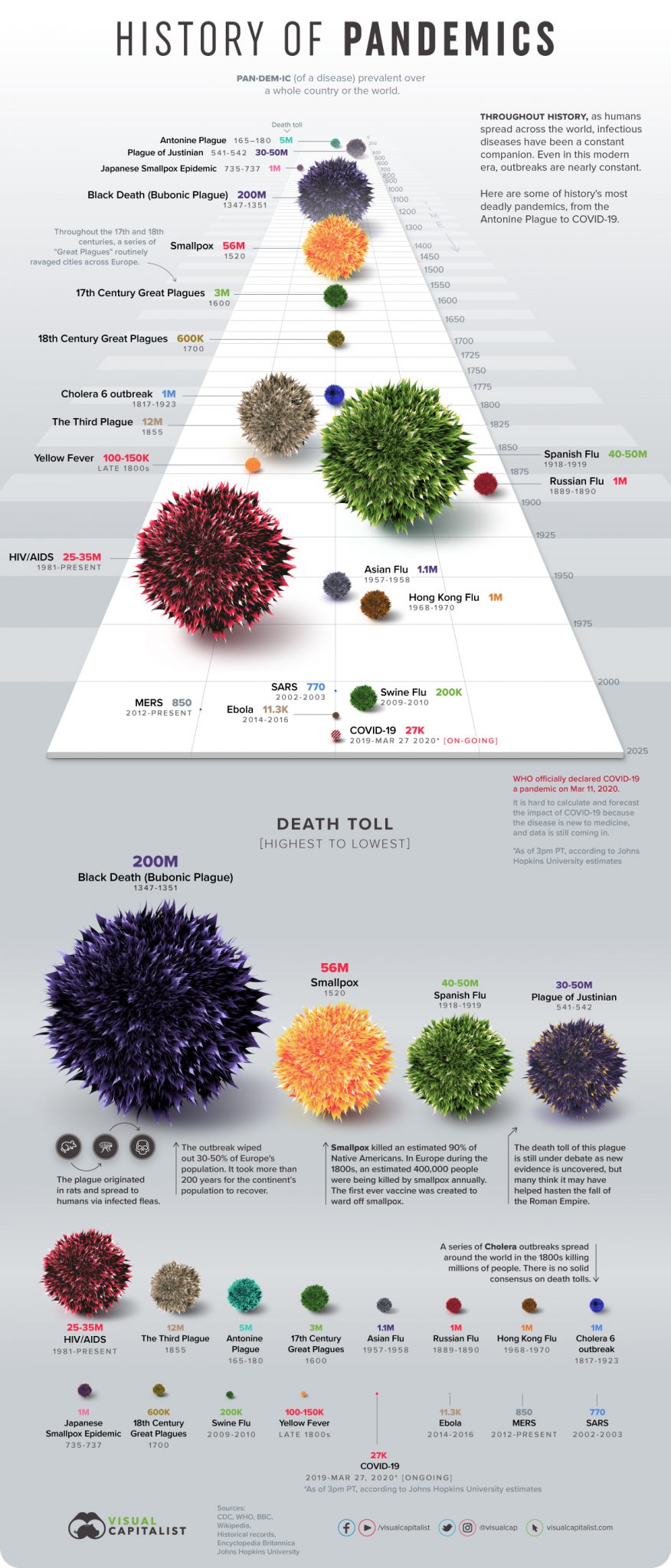
Credit @visualcapiltalist
If these numbers are a shock to you, it’s because pandemics are rarely discussed until after it happens. Our ancestors’ frequent brush with mortality at least gave them some vestige of understanding about this terrible fact of life.
Covid-19 marks the return of an old but familiar foe. Far more deadly than wars, earthquakes and volcanoes combined. The reason? Multiplicative effects.
A bullet that is shot from a barrel of a gun must be fired to find its target.
Natural disasters while earth-shattering, are normally constrained by geographical areas.
A virus like the novel coronavirus infects a host and turns them into a cellular war factory to manufacture an army of microbes.
By turning its victims into a delivery system, it makes the perfect economical weapon.
It then induces symptoms like sneezing, coughing or bleeding to allow itself to spread even further. This is what you call the replication number, or “R0” of a pathogen. And because human beings love to move around – interacting with other human beings as they do so in every manner from a handshake to hugs – they move the microbes with them at an alarming rate.
This especially when we’ve more than tripled the number of people on the planet over the last century.
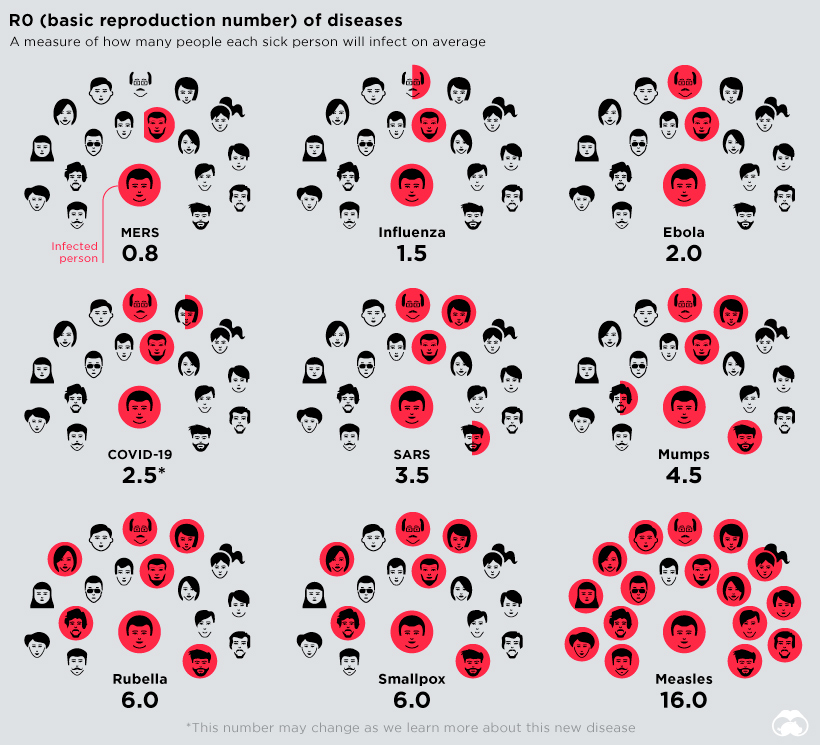
Take the mosquito-borne disease malaria. It has stalked humanity for thousands of years, and while death tolls have dropped significantly over the past 20 years, it still kills nearly half a million people every year.
For years, people have struggled to find ways to battle this invisible enemy.
Smallpox was inadvertently used to bring down the Aztecs and the Incas in the 16th century. African slaves functioned as a vector for the Spanish armada, carrying with them this silent but deadly virus. Unlike the Spanish, natives who had zero immunity were completely wiped out. Bodies lay scattered all over the city, allowing the small Spanish force to overwhelm the once mighty civilization.
This happened a century later with the North American Indians and in the 18th century, the aborigines in Australia, New Zealand, Hawaii and Easter Island. More than 50% were killed during the early years of the British Colonization alone. Little can be done except to run and hide. Isolation only delayed the inevitable.
In 1721, Lady Mary Wortley Montagu introduced variolation as a form of early inoculation to immunize individuals from smallpox.
Yet smallpox may have killed as many as 300 million people in the 20th Century alone. It was efficient at decimating virgin populations that were still isolated bubbles in a world increasingly connected by trade routes.
Variolation was a process developed in the 10th century in China and India. It involves taking pus from the pocks of someone suffering from smallpox and inoculating healthy people with it. Usually a mild case of smallpox developed, giving lifelong immunity afterwards.
There was a risk of death from this, but in a world where smallpox was rife the odds made it worthwhile; about 0.5-2 percent of people died after variolation, compared with 20-30 per cent after natural smallpox. A major disadvantage of the practice was that variolated people could pass on severe smallpox to others.
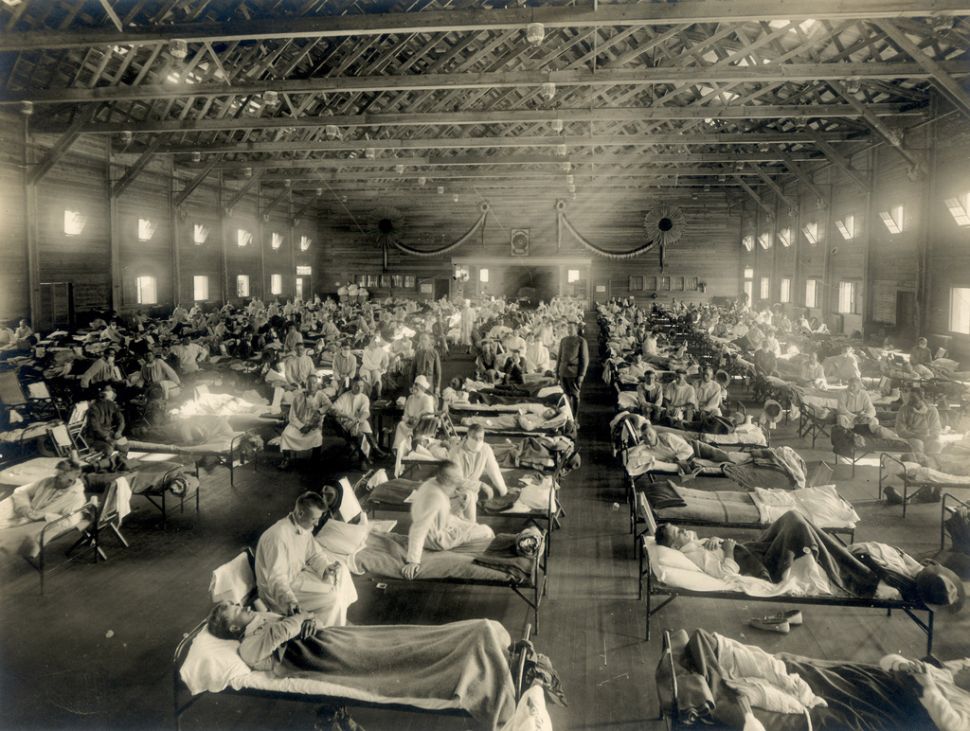
Emergency hospital during the Spanish influenza epidemic in 1918, Camp Funston, Kansas. (Image credit: Otis Historical Archives, National Museum of Health and Medicine)
An estimated 500 million people fell victim to the Spanish Flu. One-fifth died, with some indigenous communities pushed to the brink of extinction. The flu’s spread and lethality was enhanced by the cramped conditions of soldiers and poor wartime nutrition that many people were experiencing during World War I.
Despite the name Spanish Flu, the disease likely did not start in Spain. Spain was a neutral nation during the war and did not enforce strict censorship of its press, which could therefore freely publish early accounts of the illness. As a result, people falsely believed the illness was specific to Spain, and the name Spanish Flu stuck. (Read more about how Spain hated being linked to the deadly 1918 flu pandemic.)
A global pandemic of that scale was bound to happen again. Politicians were caught with their pants down.
In recent years, hundreds of health experts have written books, white papers, and op-eds warning of the possibility. Bill Gates has been telling anyone who would listen, including the 18 million viewers of his TED Talk.
In October 2019, US President Donald Trump’s Department of Health and Human Services carried out a pandemic exercise named “Crimson Contagion”, which imagined a flu pandemic starting in China and spreading around the world. The simulation predicted that 586,000 people would die in the US alone.
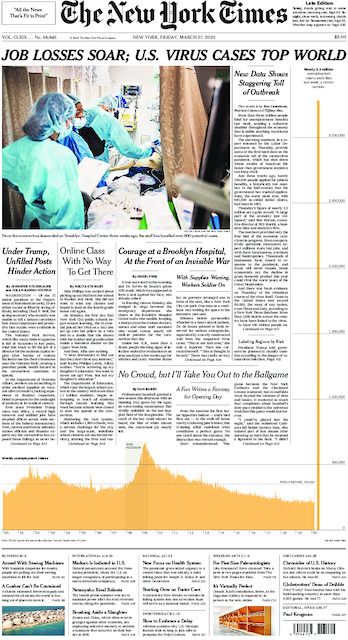
So why weren’t they adequately prepared? Why the need for such drastic shutdown of the economy? Every one percent unemployment goes up, 40,000 people die, did you know that? A record 3.3 million people filed claims for unemployment in the US alone this past week.
In times of crisis, ‘leaders‘ will always find a convenient villain to deflect the inevitable public backlash. Scapegoating. *Hint* this wouldn’t have happened if it weren’t for them…
As usual, the public will buy any narrative as long as it’s ‘not their fault’ like pigs at a trough! When that happens, people vote for people who say it’s not your fault, it’s their fault. Once people believe that it’s not your fault, it’s their fault, it’s hard to unring that bell.
What ends up happening is you drive society, you break society, and that ends up in revolutions and wars.
Part of the human journey is — right now, at this very moment — about growing up. Becoming a mature species. One capable of acting a little bit more responsibly, with more grace, generosity, goodness, decency, courage, truth, beauty, when it comes not just to the planet, the future, democracy, civilization, but also each other and ourselves. See how the Italians sing to each other in this time of crisis?
If you feel this as strongly as I do, please share this message far and wide. Share it with your friends and family. Stand up for those who are being discriminated.
This is one for the ages. A battle for humanity. Take the side of humanity not by the color of your skin. nations or borders. In order for humanity to leap forward, we need to fight this together and stop pointing fingers.
Read next: What Comes Next After a Pandemic?






